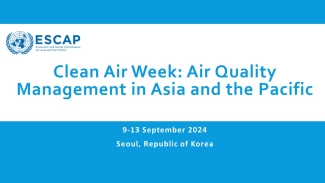Clean Air Week: Air Quality Management in Asia and the Pacific

A high proportion of the population in the Asia-Pacific region breathes air that does not meet WHO air quality standards. Air pollution in the region has severe local and transboundary impacts and addressing the complexity of managing air quality requires approaches that go beyond individual country efforts and foster cooperation among various levels of jurisdiction, including regional, national and subnational authorities.
Sharing data, monitoring systems, and policy approaches across countries can lead to more effective and cost-efficient air pollution management strategies. Coordinated regional actions can maximize the benefits and minimize the costs compared to unilateral efforts. Regional cooperation also facilitates the exchange of scientific knowledge, best practices and technological innovations to tackle this complex challenge. Peer-to-peer learning and joint problem-solving can accelerate progress.
For this reason, ESCAP, in cooperation with the Republic of Korea as the host country, will hold a series of meetings and trainings on air quality management. The aim of this series will be to encourage greater dialogue and cooperation on air pollution, share and learn the management of air pollution and showcase the utilization of science for effective decision and policy making.
This series of events will be held from 9 to 13 September in Seoul, Republic of Korea. Participants will include government officials and experts responsible for air quality management in ESCAP member States, with each day covering a different air quality event:
- Day 1: Regional Action Programme on Air Pollution
- Day 2: NEACAP Symposium on Air Pollutant Emissions Inventory and Air Quality Management
- Day 3. Air Pollution Monitoring
- Day 4. Air Pollution Management
- Day 5: Use of data from the Geostationary Environmental Monitoring Spectrometer (GEMS) for monitoring air pollution
 Back to Meetings
Back to Meetings